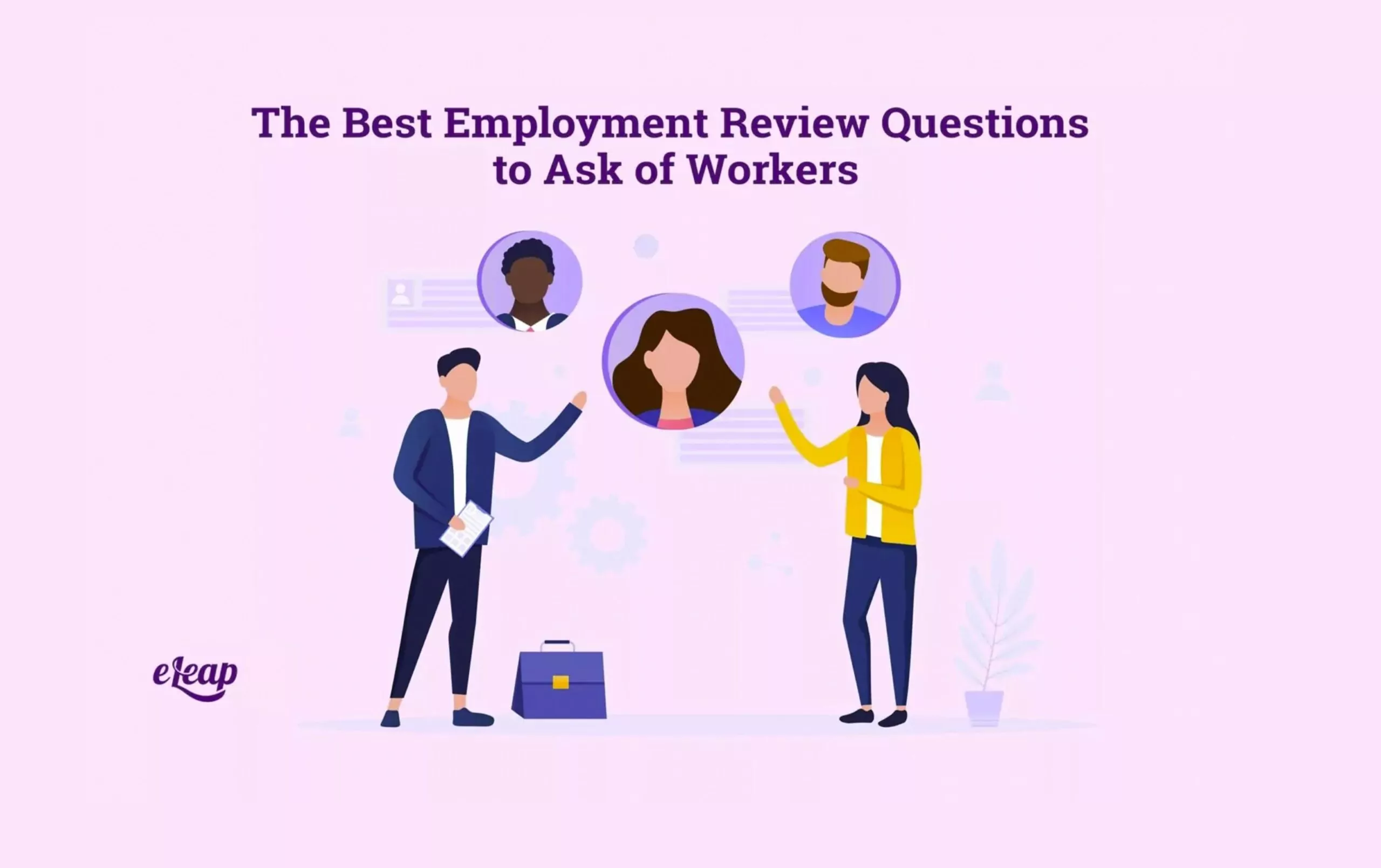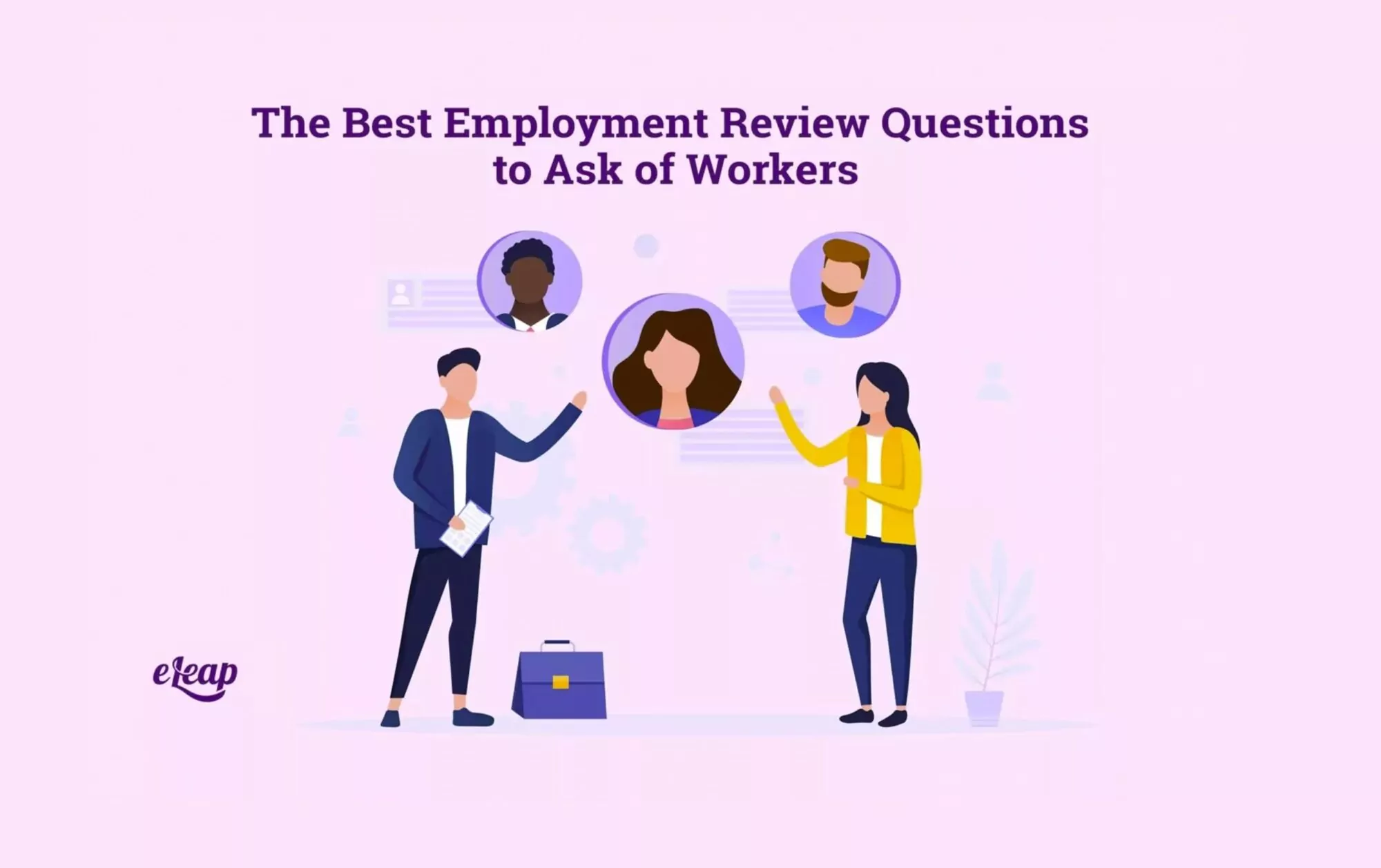The Best Employment Review Questions to Ask of Workers

Employment review questions can clue you on how workers feel about the workplace. Knowing the right questions to ask can put you on a path to ensuring an employee is happy in their position.
Sure, annual (or more frequent) reviews need to focus on performance. But they can also open up broader discussions. Learn about worker strengths, whether they align with organizational goals, and make sure employees are empowered to develop their talents.

The best performance reviews bring leaders and HR managers together. The main goal is to ensure team performance is understood and analyzed. This means managers have to know the right employment review questions to bring out.
This article will focus on the importance of employment review questions. We’ll share why it matters that you ask questions. We’ll also make sure you have tons of questions to ask at the next performance reviews you hold for your team.
Employment Review Questions About Performance
The first employment review questions to ask should focus on overall performance. Let the employee give their own thoughts on how they have been doing. These questions are important to see how a worker feels about their performance and what they might be most proud of.
Another branch of this is finding out whether the employee feels they did or didn’t do well meeting set goals since the last review. Learn about what motivates them and which working environment makes them most productive.
Everyone is different. What motivates you might not be the same thing that motivates team members. Learn more about what inspires them so you can create the results you want from every team member.
There are several employment review questions that can start a conversation about overall performance:
- Which accomplishments over the last six months have you felt proud of?
- Which goals did you fail to reach?
- Which goals did you meet?
- What things give you the motivation to get projects done?
- Are there things that I can do to make the job more enjoyable?
- What kind of working conditions are ideal for you to be at your most productive?
- What has been your biggest accomplishment in this position?
- What accomplishments do you hope to have in the next 12 months?
Questions All About Strengths
Focusing on worker strengths is essential. You want to acknowledge the great things they are doing in the position. This is another place to focus on during employment review questions.
When you ask about strengths, you get additional insight. Some of the qualities a worker has may not be the ones you notice yourself. Many leaders aren’t aware of all skills an employee has because there’s been no way to showcase all of them.
Having insight into worker strengths is essential during a performance review. The more you know, the better you can manage the team member’s strengths. This can offer a benefit for the company as a whole.
A few of the employment review questions in this area include:
- What types of work are simplest for you?
- Which skills do you have that the company could use more effectively?
- What makes you a great fit for the position you’re in?
- Which personal strengths make you able to do your job well?
Employment Review Questions About Weaknesses
After you work through strengths, move to weaknesses. However, frame it differently. Instead of weaknesses, these can instead be seen as areas of improvement.
This doesn’t have to be a negative part of the review. Instead, you learn what a worker wants to improve on so you can give them the tools to do it. Everyone has areas that can improve, so don’t be afraid to provide constructive criticism.
Even the best worker can get better. It’s valuable to have a conversation that might make them even more effective.
The Harvard Business Review explains that employees want more negative and accurate feedback. As a leader, doing so is a good thing. However, avoid being too harsh as this can affect retention and worker well-being.
Don’t be critical. Instead, be constructive with your conversations.
Rather than leaving a ton of feedback, which can overwhelm you, focus on one or two points. Otherwise, not everything will be remembered, and the process can feel overwhelming.
As far as employment review questions, consider these:
- Where do you believe you have areas that could be improved?
- Which projects or goals are you not proud of and why?
- What can be provided to help you better meet your goals?
- How will you handle challenging goals in the future/
- What are two to three things to focus on over the next quarter for development?
Thoughts About a Worker’s Current Position
Talking about an employee’s current role can give you tons of awareness. You can learn more about what parts of their responsibilities and job they love and which they don’t. You also learn ways to accommodate them through reorganizing tasks to ensure they’re motivated.
Ask questions about how a worker feels about their position in terms of the company’s success. It lets them know they play a part in the success and lets you recognize their value.
Make sure to ask questions about what the worker enjoys about the position. Nurture those aspects so you can ensure employees feel more satisfied in the things they do.
Below are several questions that can be used to gain information about an employee’s thoughts on their role:
- What is the best thing for you about working for this organization?
- What tasks and responsibilities are most enjoyable for you?
- Which responsibilities and tasks do you tend to enjoy least?
- What changes would you make to your role if you could?
- How does your role help the success of the organization?
- What things do you like least about the position you’re in?
Employment Review Questions About the Future
Sometimes, the easiest way to learn about a worker’s motivations is by asking about their goals and aspirations for the future. Once you know, you can provide resources and tools that help with personal development. See how you can assist in meeting goals for the next year.
With many still working in a remote setting, the way performance reviews are held may need to change in the future. Smaller but more frequent evaluations may become the norm.
As a leader, this lets you give realistic feedback, and workers can adjust to that. It’s the perfect time to move toward a people-based leadership system, where competitiveness and efficiency are eschewed for more resilience and adaptability.
When you want to ask questions about the future, the ones below are good choices:
- What are your goals for the next six months?
- What position do you want your next to be at this organization?’
- What responsibility changes would that entail?
- What kind of growth opportunities would be useful to explore to reach your goal?
- Which type of career growth is most essential to you?
Talking About Employee and Leadership Relationships
One of the most substantial benefits of performance reviews is the ability to nurture relationships with team members. Everyone enjoys a different style of leadership, so you should talk about what works best for your team members.
When you speak about how to give and take recognition and feedback, you learn how to motivate, teach, and support the team.
An easy method to do this is by asking how each worker wants you to check-in. Informal but frequent conversations might be preferred. It’s also essential to find out how you can support workers in their roles.
Use some of the questions below to get the information you desire:
- What concerns do you have about giving me feedback?
- What can I do to diminish those worries?
- How do you like to receive recognition or feedback for your work?
- What are two or three things I can do to manage you better?
- What have I done that’s most helpful for your completing your work?
- What have I done that’s least helpful to completing your tasks?
- How could we improve our relationship?
- Do you think the team does well working collaboratively?
- When has leadership hindered and helped in your work?
Employment Review Questions About Culture
A lot of employee satisfaction and engagement can be tied to the culture of the company. Checking in with workers is important on this topic. You can make sure each team member feels like they fit into the larger group.
Changing and adapting business practices is essential as trends change. Learning whether team members are comfortable with corporate culture is useful. It helps with boosting employee efficiency and productivity.
Where people work has an impact on how much they get done. Realize this has impacts on worker engagement to determine what improvements to make.
Some questions to ask about this topic include:
- What are the main factors that create success at this company?
- Are you comfortable with the company culture, or are improvements needed?
- What is the thing you like most about working in this organization?
- What can we do to have a more inclusive and diverse company?
- When were you most proud to be a part of this company?
In Conclusion
Asking the right employment review questions can give you important insight into your team. Using the topics above will help you understand the goals of the team. You can use the answers to provide what they need to improve. The eLeaP Performance Management Platform, which includes a continuous performance management system, provides organizations with powerful options to attract and retain high-caliber team members.